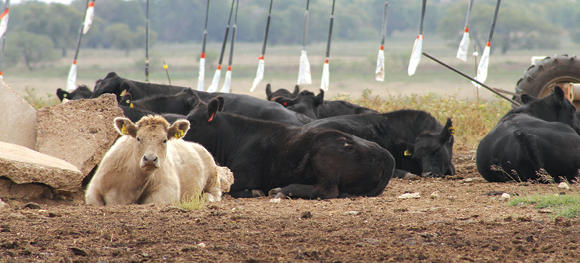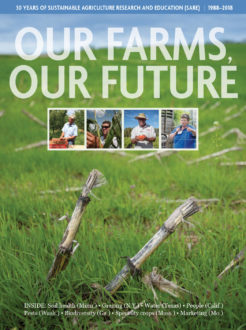Learn about SARE's broader impact on water management in the United States."We’ve come up with some profitable production systems that help the farm stay in business."
Charles West, Texas Tech University

The Challenge
Agriculture in the Texas High Plains is a big deal; with a productive mix of crops and livestock, it accounts for 40 percent of the regional economy and 59,000 jobs. Yet the future of farming in the High Plains is in doubt because of how heavily it relies on—and depletes—the Ogallala Aquifer. Studies have indicated that water levels in the Ogallala are dropping at an alarming rate. Many wells no longer pump enough to irrigate a crop, and large areas could run dry in just 50 years. Finding new production systems that are profitable and use less water is critical to keeping High Plains farms in business for future generations.
The Actions Taken
A coalition of farmers, researchers, educators and others has taken up the challenge. Over the past 20 years, SARE has awarded nearly $1.5 million in grants to Texas Tech University (TTU), Texas Coalition for Sustainable Integrated Systems (TeCSIS) and Texas Alliance for Water Conservation (TAWC) to develop alternatives to water-intensive monoculture production systems. A primary focus is adding perennial forages to cotton and corn.
The idea is that as the aquifer declines, farmers can use a small amount of water to establish fields of grasses and legumes that require very little or no irrigation. Diversifying the types of crops with such forages lowers water use on the farm while improving soil water-holding capacity and providing profitable marketing of beef, said Charles West, a TTU forage researcher. Farmers can graze beef cattle on those fields and sell them at a profit to nearby feedlots for finishing, or they can finish the cattle on grass.
The Impacts
SARE’s support for this long-term research effort began in 1997, and to date it includes nine grants to Texas Tech researchers and graduate students. Selected results include:
- Water conservation: An early finding was that a system integrating perennial grasses uses 24 percent less water than a cotton monoculture, while profitability per unit of irrigation is equal. Recent work demonstrated that interseeding alfalfa requires no additional water and increases daily weight gain for cattle compared to grass alone.
- Leveraged funding expands outreach: SARE’s early support helped the coalition earn a $6.2 million grant from the state of Texas in 2004. This led to the creation of TAWC, a producer-led effort that demonstrates the use of efficient irrigation technologies.
- Regional leadership in sustainability: “The Texas Tech University TeCSIS-TAWC program has gained a regional reputation for reliable information on forage and livestock productivity in the face of declining water supply,” West said.
Learn More
Read more about this research including SARE project reports.
